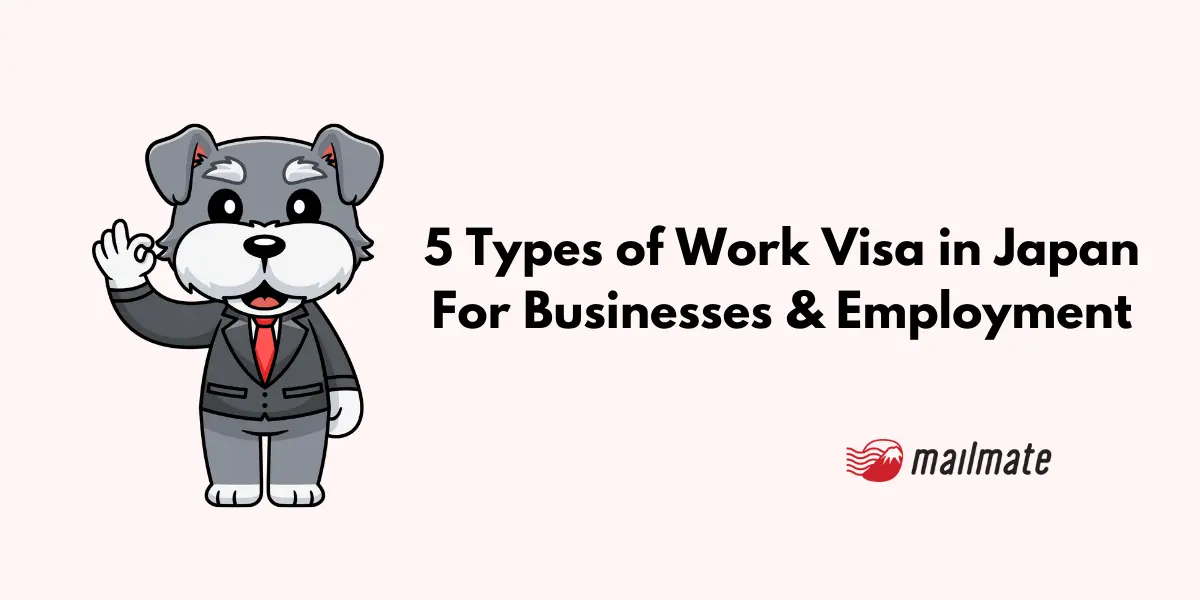5 Types of Work Visa in Japan For Businesses & Employment

Thinking of working or starting a business in Japan? There are many types of visas in Japan that will allow you to do so.
However, knowing which of Japan's visa types to apply for is crucial as you'll need to fit its criteria, which is why this article is here for you.
Note: This information is current at the time of publication, but please keep in mind that Immigration Law in Japan frequently changes, with addendums and stipulations coming into or going out of effect. Refer to the Immigration Services Agency of Japan or your immigration lawyer for situation-specific questions.
Comparison table: Types of work visas in Japan
Japan does not issue a single “work visa.” Instead, foreign nationals receive a status of residence that determines what kind of work they are permitted to do. The table below compares the most common visa types that allow employment in Japan.
Visa Type |
Who It’s For |
Key Requirements |
Work Limitations |
Engineer/Specialist in Humanities/International Services |
Professionals in IT, engineering, marketing, education, business |
Employer sponsorship, relevant degree or experience |
Restricted to approved job category |
Highly Skilled Professional (HSP) |
Highly qualified professionals meeting points criteria |
Employer sponsorship, points-based evaluation |
Limited activity expansion allowed |
Specified Skilled Worker (SSW) |
Workers in labor-shortage industries |
Skills test, Japanese language test, employer sponsorship |
Job and sector-restricted |
Skilled Labor |
Chefs, construction workers, artisans, shipbuilders |
Proven professional experience, employer sponsorship |
Restricted to approved occupation |
Intra-Company Transferee |
Employees transferred from overseas branches |
1+ year with overseas office, company transfer |
No job change or freelancing |
Business Manager |
Company founders, executives, branch managers |
Business plan, capital, physical office |
Must manage approved business |
Startup Visa |
Early-stage founders in designated regions |
Approval from local government |
Time-limited, must transition to Business Manager |
Professor / Researcher / Instructor |
Academic and educational professionals |
Employer sponsorship, academic credentials |
Restricted to educational institutions |
Medical/Legal/Accounting Services |
Licensed professionals |
Japanese national licensing, employer sponsorship |
Restricted to licensed activities |
Technical Intern Training |
Skills-transfer trainees |
Sponsoring organization, training program |
Strict activity and employer limits |
Permanent Resident |
Long-term residents |
Long-term stay, good conduct, income stability |
No work restrictions |
Spouse of Japanese National/PR |
Family members |
Proof of relationship |
No work restrictions |
Working Holiday |
Young nationals of eligible countries |
Nationality eligibility, financial proof |
Intended for short-term, incidental work |
1. Work status visas for Japan (employment-specific)

Other common types of working visa in Japan to apply to
There are several Japan work visa types available, and they are the most common type of visa as it covers a wide range of occupations and professions.
a. Engineer/Specialist in Humanities/International Services Visa
This type of working visa in Japan is for professionals working in fields such as:
IT
Engineering
International Business
Education
Marketing
Many Japanese companies hire people under this visa type as it has the broadest scope for eligible foreign workers, often requiring a university degree for humanities and international services positions.
b. Highly Skilled Professional Visa
Also known as the HSP Visa, the visa classifies foreign nationals as highly skilled professionals within the human resources category as they can contribute significantly to Japan's academic research and economic development across various fields, including natural sciences and humanities.
As such, there is a point system that takes into account an individual's:
Professional qualifications
Certificates or licenses
Research achievements
And others
The higher the qualifications and experience, the higher the individual's points. With such qualifications, an HSP Visa offers more opportunities than the standard work visa, including freelancing, getting PR quicker, and bringing family more easily.
c. Skilled Labor Visa
The Skilled Labor Visa is for individuals with expertise in specific labor fields requiring specialized skills or training. It usually includes occupation in:
Construction
Cooking
Caregiving
Shipbuilding
Processing materials
Applicants must provide evidence of their skills, such as certifications, training, or extensive work experience in their field.
This visa allows skilled professionals to work in Japan in roles that demand their expertise.
d. Intra-Company Transferee Visa
This type of visa would be great if your company had an overseas branch or office in Japan. It allows employees to get overseas training, have international experience, and contribute to the company's Japanese operations.
It allows a foreign national staff member to be relocated to Japan to engage in specified work roles within the company.
Because of the scale, this visa type is more suitable for multinational corporations with offices in Japan.
Additionally, the applicant must have worked at the company's overseas office for at least one year before the transfer.
2. The Business Manager Visa
The Business Manager visa allows individuals to manage a business in Japan if a pre-existing business exists.
This visa requires:
30 million yen in investment capital
At least one full-time employee
Other requirements
This visa is best suited for founders, presidents, directors, managing partners, and branch office managers, and it can be renewed based on the business's profits. If your business performs well, the visa can be renewed.
This working visa is also referred to as the Investor visa.
3. The Four-Month Business Manager Visa
This Business Visa in Japan only lasts for 4 months and is part of a visa reform act passed in 2015, allowing you to be in Japan for 120 days to get your business affairs in order.
As such, you can use this type of visa for:
Opening a corporate account
Start with paperwork for a longer-term Business Manager Visa
Once your paperwork is in order and your business is up, you can start the application for a 1-year Business Manager visa.
4. The Startup Visa
The Startup Visa in Japan is perfect for those who still need more capital.
Japan's Ministry of Economy, Trade and Industry (METI) started the Startup Visa Program to allow individuals to enter Japan's "special zones" to stay for a year without immediate investments or the other requirements for a Business Manager visa or the Four-Month Business Manager visa.
5. Other visas that allow you to work in Japan
You can also engage in entrepreneurship or freelance work if you hold certain other types of visas:
Digital Nomad Visa: You must show that you have earned 10 million yen and have private health insurance to cover your stay.
Permanent Resident Visa: This visa allows you to engage in any legal activity, including running a business.
Spouse or Child of Japanese National or Permanent Resident: You can work or start a business without much restriction.
Working Holiday Visa: For citizens of certain countries to work and travel in Japan for up to one year. However, you can only work part-time since it also acts as a holiday visa.
Choosing the right work visa in Japan
Choosing the correct work visa in Japan is not about job titles—it’s about what activities you will actually perform. Immigration authorities assess your application based on your daily work duties, employer relationship, and compensation structure, not just your role name.
Use the criteria below to identify the most appropriate visa for your situation.
1. Are you employed by a Japanese company?
If yes, your visa will usually fall under an employment-specific work status.
Most common options include:
Engineer/Specialist in Humanities/International Services Best for professionals in IT, engineering, marketing, education, design, and business roles.
Highly Skilled Professional (HSP) Ideal if you meet the points threshold and want faster access to permanent residency.
Specified Skilled Worker (SSW) Designed for workers in designated labor-shortage industries.
Intra-Company Transferee For employees transferred from an overseas branch of the same company.
Key question immigration asks: Does your job description clearly match the permitted activities of the visa category?
2. Are you starting or managing a business in Japan?
If you plan to run, manage, or establish a company, employment visas are usually not appropriate.
Consider:
Business Manager Visa For founders, directors, and branch managers actively running a business in Japan.
Startup Visa A temporary option for early-stage founders in approved municipalities who need time to prepare before transitioning to Business Manager.
Key question immigration asks: Are you engaged in management and business operations rather than salaried employment?
3. Will you freelance or work across multiple clients?
Freelancing is not automatically allowed under most work visas.
Employment-based visas typically do not permit freelancing
Highly Skilled Professional status may allow limited side activities
Permanent Resident, Spouse, or Long-Term Resident statuses allow unrestricted freelance work.
Key question immigration asks: Is your income tied to one sponsoring entity or multiple clients?
4. Do you already have a status that allows work?
If you hold one of the following, you may not need a work visa at all:
Permanent Resident
Spouse of Japanese National
Spouse of Permanent Resident
Long-Term Resident
These statuses allow work in any industry without sponsorship.
5. Are you temporarily in Japan for exploration or setup?
If your stay is short-term or preparatory:
Working Holiday Visa: Cultural exchange with incidental work
Startup Visa: Business preparation only
Digital Nomad Visa: Remote work for non-Japanese employers (not domestic employment)
These are not substitutes for long-term work visas.
Common mistakes to avoid
Choosing a visa based on job title instead of job duties
Assuming freelancing is allowed under standard work visas
Starting business activity on a visa that does not permit management
Ignoring renewal and permanent residency implications
How can I apply for a visa in Japan?

Generally, you'll need an application form and the required documents to apply for any visa in Japan.
Depending on the type of visa you are applying for, documents will vary. However, most will require a Certificate of Eligibility Immigration Bureau in Japan and submit everything to your country's Japanese embassy or consulate.
Read also: Franchise Opportunities in Japan: Guide to Business Success
Please check Japan's Immigration Service Agency (ISA)'s visa application requirements and its application process if you are interested in applying.
Frequently Asked Questions
Can I bring my family with me on a work visa?
Many work visas in Japan allow you to bring dependents, such as a spouse or children. You'll need to apply for a Dependent Visa for them, and specific requirements may vary depending on your work visa type.
How long does it take to process a work visa in Japan?
The processing time for a work visa in Japan may take 1 to 3 months.
What happens if my work visa expires?
If your work visa expires, you must either renew it, change to a different visa status, or leave Japan.
Can I study in Japan on a work visa?
You can study part-time while on a work visa in Japan. However, you must apply for a Student Visa if you wish to study full-time.
Is there a language requirement for obtaining a work visa in Japan?
While not always mandatory, proficiency in Japanese can be beneficial for some work visas. Some employers may require language skills, which can help you daily in Japan.
How many types of visas are in Japan?
Japan currently has about 30 visa statuses, excluding temporary visitors, where each person will get a Japanese residence card when they enter.
In closing
Determining between these types of work visas will depend on the particulars of your startup capital, business category, and risk tolerance.
In making your decision, we suggest seeking the advice of immigration specialists who can not only help you navigate Japan's immigration laws but who can also serve as a proxy in submitting your paperwork.
Spending too long figuring out your Japanese mail?
Virtual mail + translation services start at 3800 per month. 30-day money-back guarantee.

